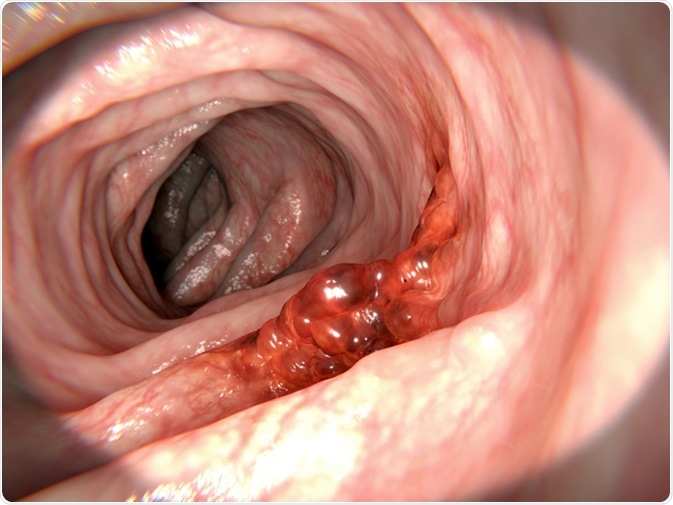
Colorectal Cancer Pathogenesis
What is Colorectal Cancer?
Colorectal cancer is the development of cancer within the colon or rectum. There is both primary and metastatic forms of colorectal cancer. Colorectal cancer development begins with the formation of a small fixed adenoma. This progresses into a more advanced, larger fixed adenoma. The tumor further develops into a large carcinoma covering a wide circumference of the colon/rectum. More aggressive forms will grow even bigger and begin to block the lumen of the colon/rectum.
The incidence of colorectal cancer has risen over the past few decades. The development of colorectal cancer is mainly due to genomic and epigenomic instability. Understanding more about its development will improve the diagnostics and treatment of colorectal cancer in the future.

Colorectal cancer 3d rendering. Image Credit: Juan Gaertner / Shutterstock
Factors in the Development of Colorectal Cancer
In the last few decades, the incidence of colorectal cancer has increased, and now accounts for ~10% of cancer-related deaths in the West. This may be explained by the fact that the life expectancy has increased in economically developed countries; also, there has been an increase in the risk factors associated with the development of colorectal cancer.
Both genetic and environmental factors are important in the development of colorectal cancer. Most colorectal cancer cases are sporadic with only a small number being hereditary in nature. The risk of developing colorectal cancer increases drastically if there is a history of this illness in an immediate family member. The risk is still higher for individuals with 2 or more affected family members.
The hereditary forms of colorectal cancer such as Lynch syndrome are caused by a mutation in one of the DNA mismatch repair genes, which include MLH1, MSH2, MSH6, PMS2, and EPCAM. Mutations in these genes inhibit the ability for proper mismatch repair during replication, causing an accumulation of DNA mutations. This can lead to microsatellite instability.
Another hereditary form of colorectal cancer is familial adenomatous polyposis. This is caused by mutations in the adenomatous polyposis coli (APC) gene, which controls the activity of the Wnt signaling pathway. Most patients with this form of colorectal cancer develop it at a very young age. Inflammatory bowel disease is also associated with an increased risk of colorectal cancer.
Many lifestyle factors influence the risk of developing colorectal cancer. These risk factors include smoking, alcohol consumption, and increased body weight. Patients with type 2 diabetes mellitus also have an increased risk of developing colorectal cancer. Previous studies have shown that 16-71% of colorectal cancers in Europe and the US are caused by lifestyle factors.
Pathogenesis of Colorectal Cancer
Genomic and epigenomic instability contributes greatly to the formation of colorectal cancers. Some major forms of instability include
- Chromosomal instability (CIN)
- Microsatellite instability (MSI)
- Non-MSI hypermutability
- Global DNA hypomethylation
Chromosomal Instability
This form of instability is seen in as many as 85% of colorectal cancers. Chromosomal instability is the presence of aneuploid or polyploid DNA. These structural changes in chromosomes can be assessed using techniques such as flow cytometry and whole exome sequencing. Unfortunately, there are no standardized criteria for determining if a diagnosis of colorectal cancer also includes CIN, making it difficult to compare results from different studies.
Microsatellite Instability
Colorectal cancers that have microsatellite instability account for ~15% of colorectal cancers. The mutations seen in this type of colorectal cancer are distinct from those seen in CIN colorectal cancers. MSI colorectal cancers are characterized by the presence of at least 30% unstable microsatellite loci. The mechanisms of MSI are very well understood as they usually involve the inactivation of DNA mismatch repair genes.
CpG Islands and Global Hypomethylation
Hypermethylation of gene loci containing CpG islands, as well as global DNA hypomethylation, can cause colorectal cancer. There is a subset of colorectal cancers that have an increased proportion of methylated CpG loci compared to other forms of colorectal cancer. These are referred to as having a CpG island methylator phenotype (CIMP). As CIMPs are very heterogenous the mechanisms that cause them are unknown. Overexpression of DNA methyltransferases (e.g. DNMT3B or DNMT1) have been shown to correlate with CIMP.
A global decrease in methylation has been identified in many colorectal cancers. The mechanisms responsible for this are unknown. Some studies have suggested it plays a role in the induction of oncogene expression, and others indicate that it plays a role in the development of CIN. To draw any concrete conclusions, further study into the effects of global DNA hypomethylation of colorectal cancer needs to be performed.
Further Research into Colorectal Cancers
The development of colorectal cancers is very complex, with many different causes. As colorectal cancers are very heterogeneous, the risk factors that contribute to them are numerous and very varied.
More research into the causes of colorectal cancers will provide more knowledge on the exact mechanisms that lead to the development of each type. This will give better methods to screen for, treat, and prevent colorectal cancers in the future.
Sources
Further Reading
Last Updated: Oct 8, 2018



































No hay comentarios:
Publicar un comentario